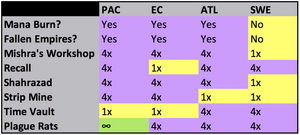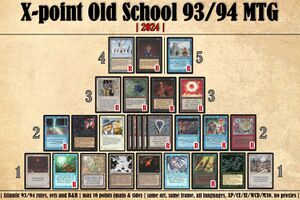Old School
| Old School | |||
|---|---|---|---|
| Where to Play | |||
| Paper | MTGO | Arena | |
| Constructed | |||
| Players | 2+ | ||
| Life | 20 points | ||
| Decks | 60+ cards (plus sideboard, ≤4 card copies) | ||
| Scryfall Statistics | |||
|
975 legal cards | |||
|
7 banned cards | |||
Old School is an umbrella term for a range of casual constructed formats which are limited to cards printed in the early days of Magic: The Gathering. There are many variations, often with different rules set regionally by a playgroup or a local tournament organizer.[1] Old School decks can play some of the most powerful spells in the game's history like the Power Nine, however, this is balanced by the relative weakness of available creatures.
Old School 93/94
Old School 93/94 is the most popular variant of Old School. As the name suggests only cards that were originally printed in 1993 or 1994 are legal in 93/94.
Swedish
93/94 was created in 2007 by a Swede by the name of Magnus de Laval[2]. Only seven sets were legal:
The intention was to recreate the experience of Magic before the release of Revised Edition and Fallen Empires. Those expansions were printed in much higher quantities than previous sets which naturally changed the nature of collecting the game.
| “ | The hard, time-consuming, and expensive road to build most decks is considered an important feature of the format. It is a throwback to a time when card availability and treasure hunting were a part of building decks. You play with what you own and try to find what you need.[3] | ” |
As a consequence games of 93/94 played under a strict Swedish rule set don't allow reprints from Revised Edition or any other set.

"American"
As Old School 93/94 expanded outside of Sweden new groups or tournament organizers would make adjustments to suit their preferences. Some of the more popular rule sets for 93/94 now used globally originated from groups based in the United States or Canada. These are Atlantic[4], Boreal[5], Eternal Central (EC)[6], and Pacific (PAC)[7]. These groups all added Fallen Empires to the format, and differ mainly with their restricted lists. The reintroduction of Mana burn in these formats has also had the effect of weakening popular cards like Su-chi and Mana Drain.
Reprints
The reprint policy can vary between different groups and events, but generally "same frame, same art" is a good heuristic. A strict Swedish style reprint policy is rare outside Swedish events, and in almost all cases Fourth Edition and Chronicles printings (from 1995) are accepted. Additionally, non-Foil reprints from Fifth Edition, Sixth Edition, Time Spiral "Timeshifted" and newer retro frame versions that use the card's original illustration can usually be played.
Old School events are seldom sanctioned. This means that cards from Collectors' Edition, World Championship Decks, and 30th Anniversary Edition, which aren't legal in official formats, often can be in Old School.
Chaos Orb
Chaos Orb is an iconic card in Old School formats, where it is usually played with errata. For instance, from Eternal Central:
| “ | 1, Tap: Choose a non-token permanent on the battlefield. If Chaos Orb is on the battlefield, flip Chaos Orb onto the battlefield from a height of at least one foot. If Chaos Orb turns over completely at least 360 degrees during the flip, and lands resting on the chosen permanent, destroy that permanent. Then destroy Chaos Orb.[8] | ” |
Variants

There are many variants of Old School. Some are created for a single event or are confined to a particular playgroup. But others have become established formats in their rights. Variants of Old School can broadly be categorized into one or more of the following categories:
- Pointed: Old School formats can use a points system, similar to Canadian or "Aussie" 7 Point Highlander formats. Powerful cards are assigned a point value, and players have a maximum number of points they can use during deck construction. X-points Old School 93/94[9] is one of the most popular Old School variants, with 79 players participating in the X-points side event at Lobstercon 2024[10]. X-points uses the Atlantic 93/94 restricted list and reprint policy, with the addition of its points table.
- Singleton: Any form of Old School can be played with an additional singleton deck building restriction, or conventional Brawl or Commander decks can be built from a reduced card pool. 7pts Singleton[11] is an Old School singleton format with regular tournaments and webcam leagues.
- Ice Age: Formats such as Alpha to Alliances (A2A)[12] expand the core 93/94 card pool into the Ice Age block, while others like ALICE[13] have a reduced card pool of only Ice Age and Alliances.
- Early expansions: Some Old School variants eschew cards from Limited Edition completely and focus on cards from the first black-bordered expansion sets (with the addition of basic land). The most notable of these is Four Horsemen[14], whose name refers to the first four Magic sets: Arabian Nights, Antiquities, Legends and The Dark.
- 40 card set constructed: These formats only allow cards from one particular set, with the addition of basic lands for expansions that didn't have any of their own. They generally follow the naming convention of "Set 40" so Alpha 40[15], for instance, is cards from Alpha while Fallen Empires 40[16] is cards from Fallen Empires and basics. Deck construction is 40 cards, often without the four-card limit which is usual in most constructed formats. "Set 40" formats typically instead attempt to balance gameplay by placing a limit on the number of cards of higher rarities that can be included in decks.[17]
- Ante: any Old School game can be played for Ante if agreed by both players, but this can also be done in a more organized fashion. Ante 40k[18] is a Swedish variant with extra rules around the naming of any Jewel Bird lost in Ante and the stipulation that decks must be worth at least 40.000 SEK. AAA[19] is a singleton variant of Alpha to Alliances with the addition of Ante.
Relationship to other formats
Premodern is a format that bridges the gap between Old School and Modern. It consists of cards printed in Standard-legal sets between Fourth Edition and Scourge.
Middle School is similar to Premodern, but is played with 2003 era rules and adds cards printed in supplemental set / box sets from 1995 through 2003.[20]
Old Frame Vintage intends to recreate 2003 era Vintage. The main differences are that Portal sets and Starter 1999 are allowed, the format is played with contemporary rules and errata, and the banned and restricted list is regularly modified as needed.
References
- ↑ Old School Magic @Eternal Central
- ↑ Magnus de Laval (podcast). All Tings Considered. Retrieved on 2025-02-11.
- ↑ About 93/94 (webpage). Old School Mtg: The Blag. Retrieved on 2025-02-11.
- ↑ Atlantic 93/94 Magic Rules (webpage). Eternal Central. Retrieved on 2025-02-11.
- ↑ Boreal banlist (webpage). Capital Chaos – Old School in Ottawa. Retrieved on 2025-02-11.
- ↑ Old School Magic 93-94 Rules (webpage). The Sentinel. Retrieved on 2025-02-11.
- ↑ Pacific Old School Rules (webpage). The Sentinel. Retrieved on 2025-02-11.
- ↑ Updated Errata and Wording for Falling Star, Chaos Orb, and Ring of Ma’rûf (webpage). Eternal Central. Retrieved on 2025-02-11.
- ↑ X-point (webpage). https://xpointoldschool.com/. Retrieved on 2025-02-12.
- ↑ LOBSTERCON 2024: Organizer’s Report (webpage). The Sentinel. Retrieved on 2025-02-12.
- ↑ 7-point Old School 93/94 MTG (webpage). 7-point Old School 93/94 MTG. Retrieved on 2025-02-12.
- ↑ Alpha to Alliances (webpage). Music City Old School. Retrieved on 2025-02-12.
- ↑ ALICE Tournament (webpage). Timmy's ALICE. Retrieved on 2025-02-12.
- ↑ Welcome to Four Horsemen Old School Magic (webpage). Four Horsemen Magic. Retrieved on 2025-02-12.
- ↑ Alpha 40 League (.pdf). Northern Paladins. Retrieved on 2025-02-12.
- ↑ Fallen Empires 40 (website). MTG Old Frame. Retrieved on 2025-02-12.
- ↑ Northern Paladins Revised 40 (website). Northern Paladins. Retrieved on 2025-02-12.
- ↑ Rules of hell (website). Shuffle Cut Ante. Retrieved on 2025-02-12.
- ↑ Ante (website). Music City Old School. Retrieved on 2025-02-12.
- ↑ Joe Dyer (February 27, 2019) "Kicking it like a Middle-Schooler", MTGGoldfish.